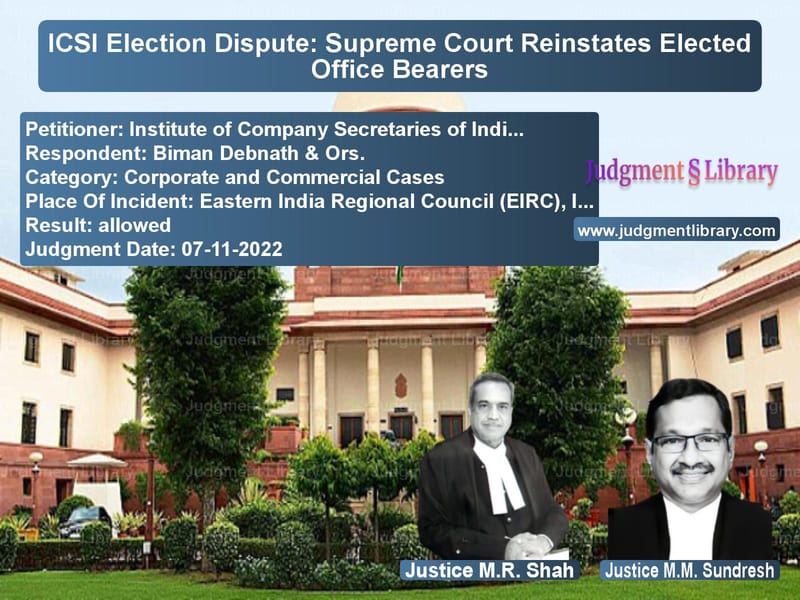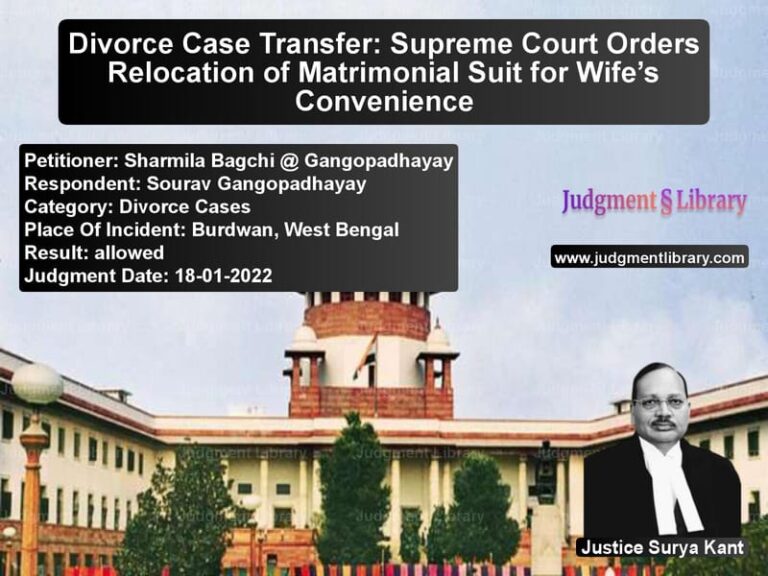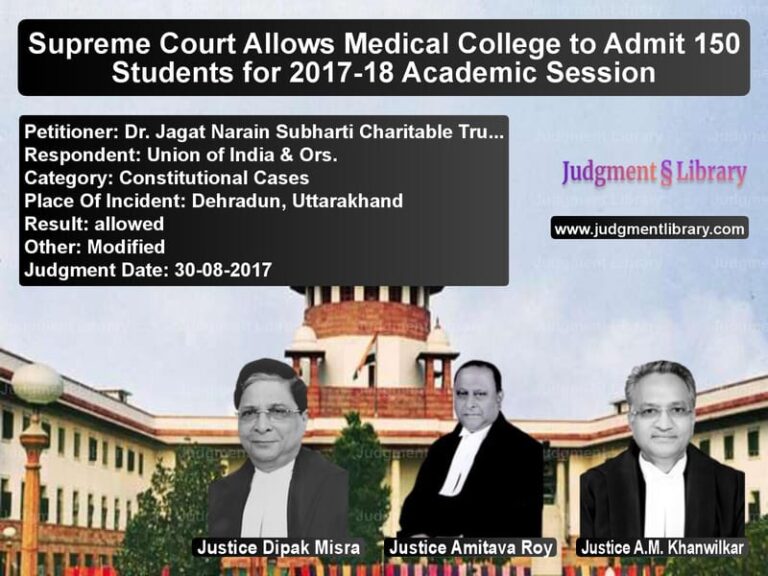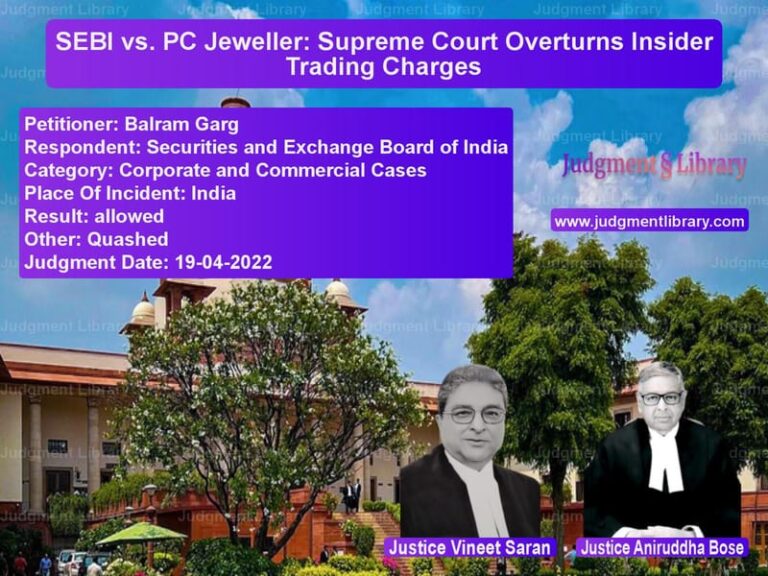ICSI Election Dispute: Supreme Court Reinstates Elected Office Bearers
The Supreme Court of India recently delivered a judgment in the case of Institute of Company Secretaries of India (ICSI) vs. Biman Debnath & Ors. The case revolved around the legality of the elections of the Eastern India Regional Council (EIRC) office bearers of ICSI, which were annulled by the Calcutta High Court. The core dispute stemmed from whether the Vice-Chairman or a newly elected Chairman should have presided over the crucial meeting of December 27, 2021.
The elections were held following the disqualification of the previous Chairman, rendering the position vacant. The ICSI argued that as per Regulation 119(2) of the Company Secretaries Regulations, 1982, a new Chairman was duly elected for the remaining term. However, the High Court sided with the respondent, ruling that the Vice-Chairman should have chaired the meeting. The Supreme Court overturned this, reinstating the elected office bearers and clarifying the distinction between ‘vacation of office’ and mere ‘absence’.
Background of the Case
The dispute arose when elections were called for the EIRC of ICSI, and a meeting was scheduled on December 27, 2021. However, just before the election, the existing Chairman was disqualified on December 22, 2021. This led to confusion regarding who should preside over the meeting. The respondents argued that the Vice-Chairman should have automatically assumed charge, while ICSI contended that the election of a new Chairman was necessary.
Arguments by the Parties
Petitioners (ICSI)
- The ICSI argued that since the Chairman was disqualified, the position fell vacant, necessitating an election as per Regulation 119(2).
- They contended that the meeting was legally convened, and the elected members followed the prescribed rules.
- ICSI submitted that Regulation 92(2), which allows the Vice-Chairman to preside in case of mere absence, was not applicable since this was a case of vacancy.
Respondents
- The respondent, Biman Debnath, argued that the meeting was illegally chaired by a member who was not the Vice-Chairman.
- It was contended that Regulation 92(2) required the Vice-Chairman to take over in the Chairman’s absence.
- The respondents claimed procedural irregularities in the election process.
Key Observations by the Supreme Court
The Supreme Court analyzed the regulatory provisions and found that:
- Regulation 117(2) specifies that if an elected member is disqualified, their office is deemed vacated.
- Regulation 119(2) clearly states that when an office falls vacant, a new election must be held to fill the position for the remaining term.
- Regulation 92(2) applies only in cases where an office bearer is temporarily absent, not where the position has been vacated.
The Supreme Court ruled:
“There is a distinction between the absence and the post fallen vacant. Regulation 92(2) shall be applicable in a case where the Chairman is absent for some reason, whereas Regulation 117(2) applies in cases where the office is vacated due to disqualification. Thus, the election of the new Chairman was valid and in accordance with the regulations.”
Final Verdict
The Supreme Court allowed the appeals, set aside the High Court’s judgment, and reinstated the elections of the EIRC office bearers. The Court emphasized that the High Court misinterpreted the regulations and erred in quashing the elections. The original writ petition was dismissed.
Conclusion
This ruling has significant implications for governance in professional bodies. It clarifies the distinction between absence and vacancy, ensuring that procedural interpretations do not undermine the integrity of elections. The judgment reaffirms the necessity of following institutional regulations while safeguarding democratic processes within regulatory bodies like ICSI.
Petitioner Name: Institute of Company Secretaries of India.Respondent Name: Biman Debnath & Ors..Judgment By: Justice M.R. Shah, Justice M.M. Sundresh.Place Of Incident: Eastern India Regional Council (EIRC), ICSI.Judgment Date: 07-11-2022.
Don’t miss out on the full details! Download the complete judgment in PDF format below and gain valuable insights instantly!
Download Judgment: institute-of-company-vs-biman-debnath-&-ors.-supreme-court-of-india-judgment-dated-07-11-2022.pdf
Directly Download Judgment: Directly download this Judgment
See all petitions in Corporate Governance
See all petitions in Company Law
See all petitions in unfair trade practices
See all petitions in Judgment by Mukeshkumar Rasikbhai Shah
See all petitions in Judgment by M.M. Sundresh
See all petitions in allowed
See all petitions in supreme court of India judgments November 2022
See all petitions in 2022 judgments
See all posts in Corporate and Commercial Cases Category
See all allowed petitions in Corporate and Commercial Cases Category
See all Dismissed petitions in Corporate and Commercial Cases Category
See all partially allowed petitions in Corporate and Commercial Cases Category







